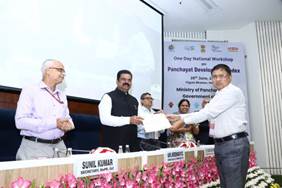
Report on Panchayat Development Index was released at the hands of Union Minister of State for Panchayati Raj Shri Kapil Moreshwar Patil at National Workshop on Panchayat Development Index (PDI) here today.
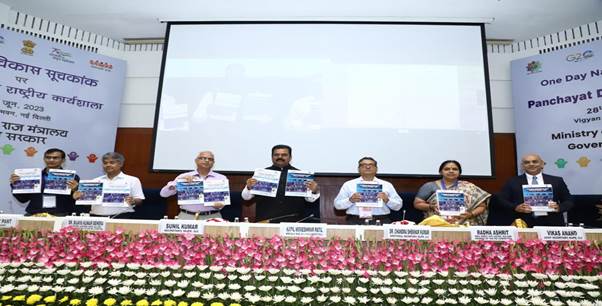
More than 250 participants including Senior Officers of different Ministries and Departments of Government of India, Principal Secretaries along with the Senior Officers of the Departments of Panchayati Raj, Rural Development, Planning & Statistics and Programme Monitoring, Directors of SIRD&PRs, Senior Technical Officers of State NIC and Officials of SDG Cell and other key stake-holders participated in the National Workshop on Panchayat Development Index.
The main focus of the National Workshop was to develop strategic plan and roadmap on integration of Ministry’s portal /dashboard to build data ecosystem, assess the schematic progress in alignment with LSDGs at Panchayat and institutional mechanisms for implementation of the Panchayat Development Index with active support of different Ministries / Departments, Panchayats and Knowledge Partners. The National Workshop was well received and proved to be remarkably effective at bringing all the stakeholders on board for paving the path for building robust mechanism for evidence based development at all levels.
In his address to participants, Shri Patil underlined that the Central Government under visionary leadership of Prime Minister Shri Narendra Modi has intensified its efforts during the last more than nine years to support the Panchayati Raj Institutions (PRIs) in the best manner possible to ensure that the basic objectives of the Panchayati Raj are achieved in true letter and spirit. We have witnessed a quantum leap in the allocation of fiscal resources to Panchayati Raj Institutions to support various infrastructure requirements and developmental activities in rural areas. A series of pro-Panchayat initiatives have ushered in a new era in which Panchayats can come forward to decide their own destiny.
Addressing the National Workshop, Shri Kapil Moreshwar Patil stressed that all-around development and transformation of villages is not possible without the support of all stake-holders. He emphasized that there is a need to work collectively in the right earnest to continuously encourage and incentivize the Panchayats in order to achieve the Sustainable Development Goals (SDGs) in rural areas within a definite time frame. The Union Minister said, there should be healthy competition among the Panchayats on the parameters of overall development. He expressed that Gram Panchayats should also extend help to each other so that every Gram Panchayat moves ahead together on the path of progress and prosperity.
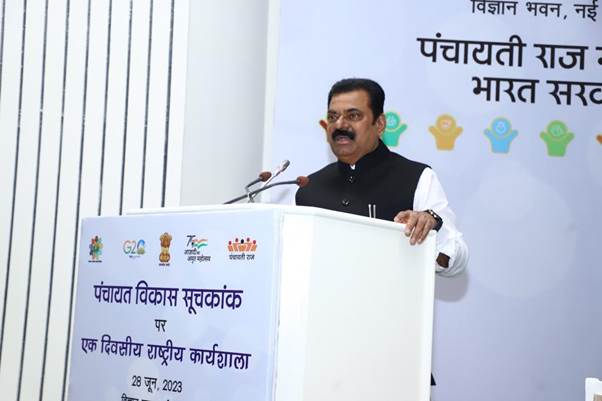
We have been taking many initiatives for strengthening and empowering Panchayati Raj Institutions, increasing the capacity of representatives of PRIs to fulfill their role and responsibilities and improving the efficiency, transparency of functioning and accountability of PRIs to contribute towards inclusive development, economic growth and achieving the Sustainable Development Goals (SDGs), said Shri Kapil Moreshwar Patil.
Shri Sunil Kumar, Secretary, Ministry of Panchayati Raj highlighted the need of evidence based Development Goals at all levels through Panchayat Development Index while addressing the National Workshop on Panchayat Development Index, and said that the Panchayat Development Index is a logical combination of various steps that we are taking for years, if Panchayats decide to attain the Sustainable Development Goals then they will find resources for it; lot of developmental work took place in past one and a half years.
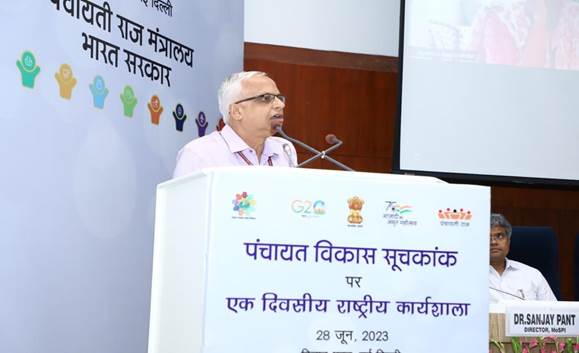
Dr. Chandra Shekhar Kumar, Additional Secretary, Ministry of Panchayati Raj delivered keynote address on Panchayat Development Index to measure the incremental progress towards the achievement of Localization of Sustainable Development Goals (LSDGs) through Panchayats at National Workshop on Panchayat Development Index at Vigyan Bhawan, New Delhi. In his address, Dr. Kumar said all States/ UTs deserve accolades and appreciations for their efforts in this direction; PDI exercise is a data intensive work; further added that we need to do evidence-based planning, resources must be deployed where required for overall development.
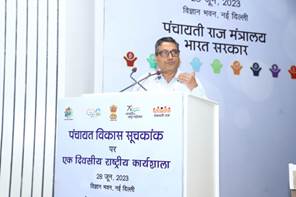
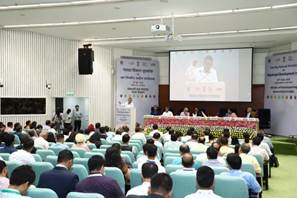
Shri Vikas Anand, Joint Secretary, Ministry of Panchayati Raj while making Presentation on Report of Panchayat Development Index and Road Ahead for the institutionalization of PDI said that States/ UTs can also use the PDI for Panchayati Raj Awards and emphasised on adopting data-driven and evidence-based approach towards developmental activities.
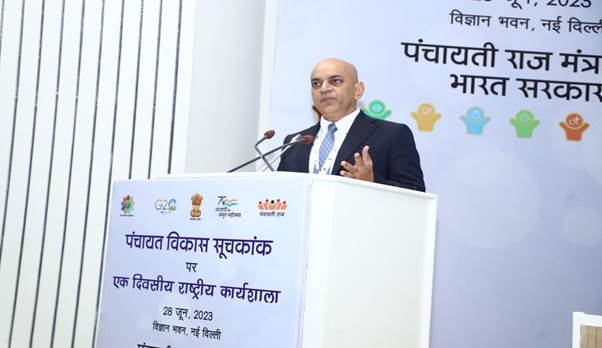
Union Minister of State for Panchayati Raj Shri Kapil Moreshwar Patil conferred a certificate of appreciation to the team of Maharashtra for their significant contribution to Panchayat Development Index.
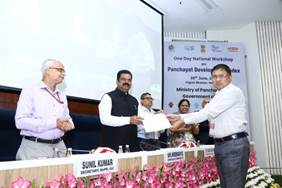
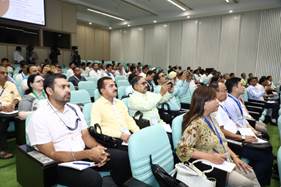
Shri (Dr.) Bijaya Kumar Behera, Economic Advisor, Ministry of Panchayati Raj and Member–Secretary of Panchayat Development Index (PDI) Committee made presentation of State’s Initiatives on Panchayat Development Index and later deliveredvote of thanks at National Workshop. Dr. Behera said that as we prepare a report like PDI, we need a comparative picture; PDI Committee interacted with 19 States on their efforts to develop LIFs for implementation of LSDGs; a participatory and theme based planning process is adopted for development.
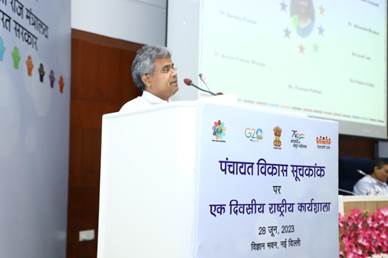
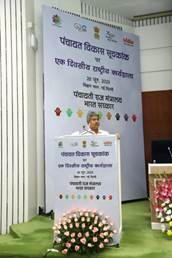
Smt. Jayashree Raghunandan, Former Additional Chief Secretary, Government of Tamil Nadu & Chairperson of the Committee on PDI said that data holds utmost importance for this entire process, data collection must be easy and simple, and training and capacity building crucial for data collection.
Smt. Uma Mahadevan, Additional Chief Secretary to Government of Karnataka highlighted State’s initiatives over development of Panchayat Development Index and said that data belongs to all stakeholders and PDI is to be implemented in very meaningful way and perspective planning in Karnataka is sustainability based long term activity. Smt. Mandeep Kaur, Commissioner-cum-Secretary to Government of Jammu and Kashmir said that we have done localized interventions and monthly monitoring of progress in Panchayats; UT of Jammu & Kashmir took first step, creating District Good Governance Index. Dr. Sandeep Rathod, Secretary to Government of Tripura said Rural Local Bodies (RLBs) in Tripura were motivated to participate in development of local indicator frameworks for LSDGs; State Policy on LSDGs keeping parity with MoPR Guidelines.
Smt. Radha Ashrit, DDG, DMEO, NITI Aayog & Member of PDI Committee, Dr. Mallinath Kalshetti, Director, SIRD&PR, Maharashtra, Smt. Aditi Das Rout, Additional Secretary, Ministry of Women & Child Development, Shri Amit Shukla, Joint Secretary, Ministry of Rural Development, Shri Sunil Jain, DDG, NIC, Shri V. Hedge, DDG, Department of School Education & Literacy, Ministry of Education, Shri Samir Kumar, Economic Advisor, Department of Drinking Water & Sanitation, Ministry of Jal Shakti, Dr. Govind Bansal, Director (Maternal Health), Ministry of Health & Family Welfare, Shri Rajesh Gupta, Director, NITI Aayog, Dr. Sanjay Kumar, Director, Ministry of Statistics & Programme Implementation and other senior officers of Government of India and State Governments shared their views and insights and enriched the deliberations during the National workshop.
Background
India is a signatory to the United Nation 2030 Agenda for achieving inclusive; people centric and holistic Sustainable Development through 17 Goals. NITI Aayog is the Nodal institution for the implementation of Sustainable Development Goals (SDGs).Different Ministries and their Schemes are mapped with SDGs and targets. Ministry of Panchayati Raj is anchoring the process of Localization of Sustainable Development Goals (LSDGs) in PRIs. To this end, it has been our endeavour to bring together different stakeholder at one forum imbibing the spirit of ‘Whole of Government & Whole of Society’ approach.
Given that nearly 70% of India lives in rural areas, attainment of Sustainable Development Goals at the National level will require actions at the grassroots level through Panchayati Raj Institutions. Hence role of Panchayati Raj Institutions especially Gram Panchayats is very crucial in localizing the SDGs. Ministry of Panchayati Raj has initiated thematic approach through aggregating 17 SDG goals into 9 broad themes for Localization of Sustainable Development Goals (LSDGs) at the grassroots level through empowering Panchayats and other relevant stakeholders in Rural Areas. Each of these themes covers several SDGs. Adopting a thematic approach will enable easy understanding; acceptance & implementation by Panchayats with community involvement.
Capacity Building & Training of the PRIs plays pivotal role in building institutional capacity to deliver good governance and attainment of SDGs in rural areas. The main focus of the revamped Rashtriya Gram Swaraj Abhiyan is to equip the Elected Representatives & Functionaries of the PRIs with adequate knowledge and skills for effective delivery on the SDGs through concerted and collaborative efforts of Central Ministries and State line departments with ‘Whole of Government’ approach at all levels.
To keep this impetus, Series of National & Regional Workshops have been organized to empower the Elected Representatives, Functionaries of the PRIs and other key stakeholders in building capacity to deliver the goals of the development and provide a platform for exchange of learning of different exemplary practices by Panchayats.
Ministry of Panchayati Raj has been incentivizing best performing Panchayats through National Panchayat Awards. These awards have been revamped and launched during the year 2022 aligning them with 9 Localization of Sustainable Development Goals (LSDGs) themes aggregating 17 SDGs.Primary objective through this competition is to assess the performance of Panchayats in attainment of SDGs, promote competitive spirit among them and catalyze the process of LSDGs through Panchayati Raj Institutions for attaining LSDGs by 2030.
Ministry of Panchayati Raj is organizing People’s Plan Campaign (PPC) for preparation of Gram Panchayat Development Plan (GPDP) as ‘Sabki Yojana SabkaVikas’ throughout the country. In the PPC–2022, paradigm has been shifted to preparation of thematic Panchayat Development Plans converging all flagships schemes & resources to saturate SDGs by 2030. Gram Panchayats are directed to prepare holistic Gram Panchayat Development Plan (GPDP) through the lens of 9 themes.
To keep this momentum, Ministry has constituted Committee on Panchayat Development Index under the Chairmanship of Smt. Jayashree Raghunandan, Former ACS to the Government of Tamil Nadu to prepare different mechanisms for computation of Panchayat Development Index (PDI). The Committee has laid a framework on baseline for computation of PDI, identification of data source for Local Indicator Framework and workout mechanism to measure incremental progress through scores achieved by Panchayat and grades them based on their performance towards the achievement of LSDGs.
Panchayat Development Index (PDI) will play a pivotal role in the process of quantified evaluation and mechanism for computation of the composite score on 9 themes of LSDGs and will pave the way for outcome oriented development goals at Panchayats. PDI is a computation score based on local indicators of 9 themes which spur Panchayats to attain SDGs.
Panchayat Development Index (PDI) Report has come with 144 local targets, 577 local indicators and 688 data points on 9 themes of LSDGs. PDI will act as a baseline for Panchayat for setting local targets & local action points with measurable indicators in preparation of thematic Gram Panchayat Development Plan. Panchayat Development Index (PDI) also help to reflect current status of the Panchayats to take concerted actions to achieve development goals through building institutional mechanisms.



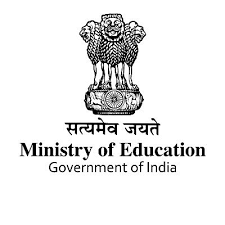


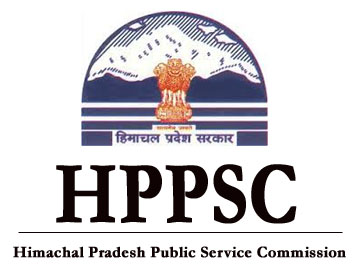
Leave a Reply
You must be logged in to post a comment.